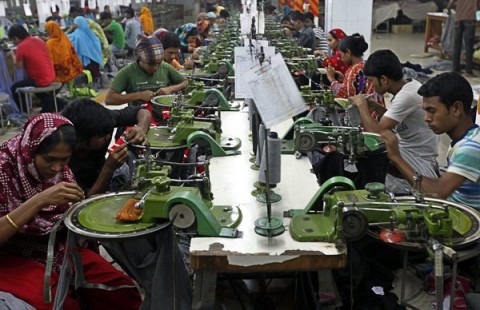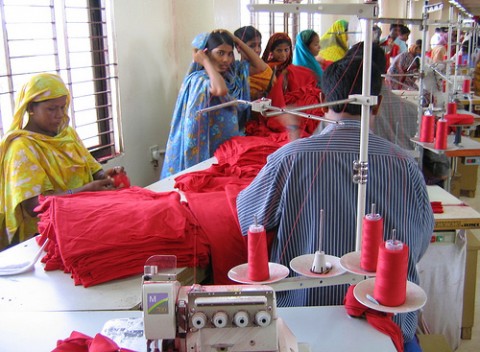by Admin | Aug 6, 2013 | Highlights
Garment worker woes, in Bangladesh, are not a recent development. In this report from the International Labor Rights Forum in 2010, the suffering and repression of factory labor in Bangladesh is made apparent. Their meager monthly wage of $43 not only far behind their demand for $72, but was also nutritionally less than prisoners in the country! Trade union leaders and human rights groups that challenged their unfair situation were subjugated. The recipe was ripe for disaster and it hit three years later.

November 1, 2010 – A report by the International Labor Rights Forum (ILRF) released today reveals a severe government crackdown on labor rights activists in Bangladesh in the last few months as the country’s garment workers demanded higher wages. Bangladeshi garment workers are the worst paid workers in the world. Worker protest against low wages and poor working conditions peaked in early August this year following the government’s announcement of a new $43 monthly minimum wage, well short of workers’ needs and expectations. The new wage is scheduled to take effect today.
“We were forced to take to the streets as the owners exploited us right under the government’s nose,” said a garment worker quoted in The Daily Star, a Bangladeshi newspaper, after the government announcement of the new minimum wage.
According to the ILRF report, Enemies of the Nation or Human Rights Defenders? Fighting Poverty Wages in Bangladesh, the new $43 dollar minimum wage is still a “malnutrition wage.” Even Bangladeshi prisoners are better off than garment workers in nutritional terms, the report claims. It estimates a garment worker needs almost four times the new minimum wage just to feed her average-sized family.
The ILRF report criticizes the Bangladeshi government for scapegoating labor activists for inciting worker unrest and branding them “enemies of the nation” instead of dealing with workers’ genuine grievances. Focusing on the experiences of the leaders of the Bangladesh Center for Worker Solidarity, one of the most prominent labor rights groups in Bangladesh, the report relates a harrowing story of persecution as Bangladeshi police and security forces, including the notorious Rapid Action Battalion, raided staff members’ homes and attempted by subterfuge to discover the hideouts of the organization’s leaders. When captured, two of the labor leaders were tortured in custody to extract a confession that the organization had fomented worker riots.
Human rights groups, labor rights groups, and industry groups have denounced the Bangladeshi crackdown on labor rights activists. Human Rights Watch condemned the “serious harassment of trade union leaders and other labor rights activists and workers in the ready-made garment (RMG) industry who have been pressing for the right of workers to organize in unions and seeking increases in Bangladesh’s minimum wage regulations” in a letter to Prime Minister Sheikh Hasina on August 10, 2010.
The ILRF report calls on both companies and the Bangladeshi government to take action to protect civil liberties for the Bangladesh Center for Worker Solidarity and other labor rights defenders and increase the minimum wage for garment workers to at least $72 per month, the workers’ demand.
“We hope that this report will help bring justice for the leaders and staff of Bangladesh Center for Worker Solidarity and, in so doing, advance the cause of Bangladeshi garment workers who seek only the basic dignity of decent work and good wages,” said Bjorn Claeson, author of the report and director of the SweatFree Communities program at ILRF.
Enemies of the Nation or Human Rights Defenders? Fighting Poverty Wages in Bangladesh is available at www.sweatfree.org/bcws.
***
The International Labor Rights Forum (ILRF) is an advocacy organization based in Washington, DC, dedicated to achieving just and humane treatment for workers worldwide. ILRF serves a unique role among human rights organizations as advocates for and with working poor around the world. We believe that all workers have the right to a safe working environment where they are treated with dignity and respect, and where they can organize freely to defend and promote their rights and interests.
A program of the International Labor Rights Forum, SweatFree Communities, coordinates a national network of grassroots campaigns that promotes humane working conditions in apparel and other labor-intensive global industries. SweatFree campaigns build broad community support for sweatshop-free government purchasing and help build a market for decent working conditions.
by Admin | Jul 25, 2013 | Highlights
Feeling the heat from international pressure, Bangladesh passed new labor laws to help improve worker rights and aid the formation of trade unions. But human rights groups say that law has only made “modest” improvements.

Source- Flickr Creative Commons/ Jankie
Steven Greenhouse from New York Times has the full article:
Under Pressure Bangladesh Adopts New Labor Law
Published: July 16, 2013- Facing intense international pressure to improve conditions for garment workers, Bangladeshi lawmakers amended the country’s labor law this week. But while the officials called the new law a landmark strengthening of workers’ protections, rights groups said the law made only modest changes and took numerous steps backward that undercut unions.
Bangladeshi lawmakers adopted the new law three weeks after the United States suspended Bangladesh’s trade preferences, saying that labor rights and safety violations were far too prevalent in that country’s factories. Moreover, the European Union has threatened to revoke Bangladesh’s trade privileges for similar reasons.
Speaking about the new law, Khandaker Mosharraf Hossain, the chairman of the parliamentary subcommittee on labor reforms, told Reuters: “The aim was to ensure workers’ rights are strengthened, and we have done that. I am hoping this will assuage global fears around this issue.”
The Bangladeshi government has faced fierce pressure to improve conditions for the nation’s four million garment workers since the Rana Plaza factory building collapsed in April, killing 1,129 workers.
Under the new law, factories will be required to set aside 5 percent of profits for a welfare fund for employees, although the law exempts export-oriented factories. Apparel is Bangladesh’s dominant industry, with $18 billion in annual exports, making it the world’s second-largest garment exporter after China.
As under the old law, workers hoping to form a union must gather signatures of 30 percent of a company’s workers — a level that was onerous, labor leaders said, because many apparel manufacturers have thousands of workers. To make unionizing easier, labor leaders were urging lawmakers to adopt a 10 percent threshold. In Bangladesh, several unions might represent employees in a single factory.
Business leaders complain that Bangladeshi unions are highly political and sometimes stage disruptive strikes as a complementary tactic to political blocs’ lobbying and infighting.
In a step that could help unionization, the new law bars the country’s labor ministry from giving factory owners the list of the 30 percent of workers who want to form a union. Labor leaders said that after receiving those lists, owners often fired union supporters or pressed many to withdraw their names from the petition, bringing the number below the requisite 30 percent mark for a union to be recognized.
Some labor leaders expressed concern that government officials would still give the names to factory owners, perhaps because of collusion or bribes.
“The government says this will make it easier for workers to organize,” said Babul Akhter, the president of the Bangladesh Garment and Industrial Workers Federation. “That’s not true.”
Mr. Akhter praised the legislation for adding some protections on fire and building safety: it strengthens requirements for permits when a factory adds floors.
Human Rights Watch said, however, that the new law would make unionizing harder. It criticized the legislation for adding more industrial sectors, including hospitals, where workers would not be permitted to form unions. The group noted that workers in Bangladesh’s important export processing zones would remain legally unable to unionize.
In addition, the government would be empowered to stop a strike if it would cause “serious hardship to the community” or be “prejudicial to the national interest.” And workers at any factory owned by foreigners or established in collaboration with foreigners would be barred from striking during the operation’s first three years.
“The Bangladesh government desperately wants to move the spotlight away from the Rana Plaza disaster, so it’s not surprising it is now trying to show that it belatedly cares about workers’ rights,” said Phil Robertson, deputy Asia director for Human Rights Watch. “This would be good news if the new law fully met international standards, but the sad reality is that the government has consciously limited basic workers’ rights while exposing workers to continued risks and exploitation.”
Under the new law, unions would need government approval before they could receive technical, health, safety or financial support from other countries.
An Obama administration official said various agencies were seeking to obtain the exact language of the new law in order to study it.
Roy Ramesh Chandra, a powerful Bangladeshi labor leader, said the legislation might not have done enough to persuade Europe not to suspend trade preferences or to get Washington to reinstate such preferences.
Jim Yardley contributed reporting.

